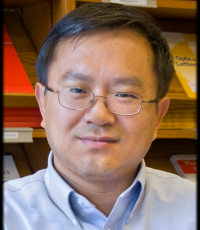- Speaker
- Dr. Lin-Wang Wang
- Lawrence Berkeley National Laboratory, USA
- Abstract
In this talk, I will present some recent work in nanostructure charge transport and charge dynamics in nanosystems. Two different methods are used to study such problems. One is the Marcus theory, another is real-time time-dependent DFT (rt-TDDFT) method. Several technical challenges need to be overcome when using Marcus theory to study nanostructure charge transport. One is the large size of the system, another is the band alignment between different subsystems. Besides, accurate calculation of the solvent reorganization energy is also important. I will also present the newly developed rt-TDDFT method, and how to use it to study the carrier dynamics. This will include the electron cooling in a quantum dot, and plasmon excitations in small metallic clusters. Finally, I will also present the GPU accelerations for ab initio simulations.
- About the Speaker
Dr. Wang has 25 years of experience in large scale electronic structure calculations. He has worked in O(N) electronic structure calculations in early 1990s. Worked with Alex Zunger, he invented the folded spectrum method which pushed the limit of nonselfconsistent electronic structure calculations from 100 atoms to thousands of atoms. He developed a linear combination of bulk bands (LCBB) method for semiconductor heterostructrure electronic structure calculations, which allows the calculation of million atom devices. He developed generalized moments method which calculates the density of state and optical absorption spectra of a given system without explicit calculation of its eigenstates. He also developed a popular parallel total energy plane wave pseudopotential program (PEtot). He invented a charge patching method, which enables the ab initio accuracy thousand atom calculations for nanosystems. He has developed a linear scaling three dimensional fragment method (LS3DF), which can be used to selfconsistently calculate systems with tens of thousands of atoms. Recently, he developed a new algorithm for real-time time-dependent DFT calculations which accelerates the traditional algorithms by hundreds of times.
- Date&Time
- 2015-12-25 10:00 AM
- Location
- Room: Conference Room II




